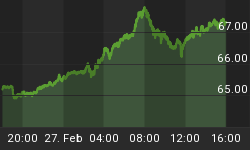A popular mantra among many gold bugs is: "the Fed is printing money." Any actions by the Fed to support liquidity in the markets are touted as "money creation" and consequently "monetary inflation" which causes gold appreciation. If gold does not rise, they proclaim that there is "manipulation" and "conspiracy".
It is fair to say that we do not see the picture in such black and white colors.
The main source of new money in the economy is not the Fed but the commercial banks. It is the private banks that increase money supply through debt (new credit) creation.
During a credit crisis which is characterized by a steep slowdown of credit creation, growth of money supply in the financial system slows as well. It is silly to think that the Fed can replace the whole system of commercial banks by creating money itself from thin air. What the Fed can do is influence money supply by adjusting interest rates creating more or less incentive for the fractional-reserve lending by the commercial banks.
Lately, the Fed has expanded its sphere of influence but these actions still do not directly cause increases in money supply. The Fed began swapping poor performing assets on the banks' balance sheets for the high quality treasuries on the Fed's balance sheet in an effort to improve the financial situation of the banking sector and restore liquidity.
Today, the biggest fear that the Fed has is the fear of deflation. The monetary policymakers understand that (a) sound banking system is a foundation of US economic prosperity and (b) the failure to support the banking system will inevitably cause deflation. We are, therefore, confident that the Fed, headed by Chairman B. Bernanke, will continue to support the banks by creating the best possible environment for the return to a normal cycle of debt/money creation and use everything in its arsenal to prevent deflation.
Going forward, gold will likely resume its up-trend due to one of two reasons:
- Another spell of problems in the financial system will cause gold (and the US treasuries) to once again take the place of safe haven investments, as was the case in the second half of 2007.
- Fear of deflation and a further slowdown in the US will spread around the world. As a result, a vicious wave of competitive devaluation will cause not only price shocks (oil, food, etc.) but also spiraling monetary inflation, eventually raising long-term bond yields. This will be the beginning of a real gold bull market when gold outperforms all other major classes of assets including most hard assets.
The second outcome, in our opinion, is inevitable but no one knows when it will come and what path it will take.
Gold Price Action
In the middle of July, gold touched its upper Bollinger Band (see weekly chart below). At that time a large wave of profit-taking and commodity liquidation began, causing gold to plunge by over $100/oz.
Gold held its May low of $946, which was critically important for the near term. Most technical analysts now see this support will eventually be breached and gold will touch its 65-week moving average in the low $800s.

Unfortunately, this outcome is now quite likely, meaning that the duration of the correction could be extended by an unknown length of time, from a couple of months to as long as a year.
One outcome that we feel we have to mention is the worst case scenario. The current commodity correction could extend for a few more months, easily pulling gold to below $800. If gold stabilizes in the $700s, lower $800s would become new resistance levels, causing precious metals to stall for a longer period of time.
Although this will in no way cancel the secular gold bull market, it will, however, likely lead to a cyclical bear market. The chart below shows that gold can fall to the lower $600s and still keep the long-run gold bull alive. During the seventies' bull market gold lost about half of its value in a period of two years, just before embarking on an unprecedented run that took the price to $850/oz.

One more point. Gold ended 2007 at $838 per ounce. Is it so outrageous to expect 2008 to be a down year for gold, after seven straight years of gains? We think not.
While this bearish outcome for gold is not unreasonable, how would gold stocks react in this scenario? This is an excerpt from the Resource Stock Guide Newsletter dated August 10, 2008.















